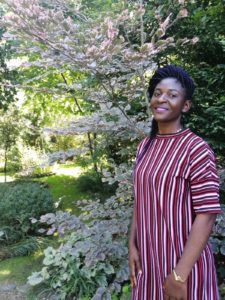Sidonie has nearly finished her MA in Human Rights at the FAU. Read here about why she chose that degree, what she has learned, about the challenges she had to overcome and the amazing experiences Sidonie has gained so far.
Tell us about yourself.
My name is Sidonie, Mankah Timah, a Cameroonian (from the North West Region; one of the English-speaking regions of the country) and holder of a BSc. Degree in Journalism and Mass Communication from the University of Buea. Currently, I am in my final semester of the MA in human rights at Friedrich Alexander University (FAU) in Germany. I am a humanitarian and sociable person with over two years of work experience with human rights organizations at the national and international level. My areas of interest are: the rights of the child, women’s rights, rights of persons with disabilities, and women and youth empowerment.
Why did you choose to pursue a master’s degree in human rights?
Originally, I wanted to pursue a master’s in Digital communications or any good communications related programs but the tuition fees scared me. Later, I developed a passion for human rights during my time with the African Union Commission’s department of Political Affairs in Addis Ababa, Ethiopia, where I served as a human rights associate (African Youth Volunteer) for one year. I moved back to my country where I volunteered with a human rights NGO known as Human is Right and later did a three months internship with the National Human Rights Institute of my country known as the National Commission on Human Rights and Freedoms. All these experiences triggered the desire to pursue a master’s in human rights in order to comprehend the fundamental aspects of this broad subject.
Additionally, prior to the Anglophone crisis, I realized that some rights groups promoting and protecting human rights lack understanding of the theoretical and practical approaches of human rights. This is reflected in the way some organizations and groups document human rights abuses or advocate for change in their reports which sometimes lack that human rights legal, philosophical, political and scientific writing style. This stirred my desire to pursue this degree in order to strike that balance when promoting, advocating for and reporting on human rights issues. It will also permit me provide advice to other rights activists and groups in order to bring the change we want in our communities, country, continent and the world at large.

Why did you choose Germany?
Most of the human rights masters programs I saw in countries such as the Netherlands, Switzerland, Australia, the UK, and the US were extremely expensive and way above my budget. When I saw the MA in Human Rights in Erlangen, I was still volunteering at the African Union’s Secretariat in Ethiopia. Germany is one of the top best countries in Europe for studies especially for International students with little budget. The friendly nature of the country, the affordability of studies in its prestigious universities and the career opportunities within and outside it spurred my choice of Germany for studies.
What do you like about the MA in Human Rights in Erlangen, Germany?
The tuition fee (4.900 euros for the entire master’s program) was the first thing that charmed me because that is the cost of tuition fees for one semester in most human rights programs in the UK, US, Switzerland and other European countries. In addition, our professors have extensive experience in human rights law, politics, philosophy and one of them is a former UN Special Rapporteur on Freedom of Religion and Beliefs (Prof. Heiner Bielefeldt) from 2010 – 2016. The interdisciplinary degree, cultural and career diversity are some of the things I admired most in the program. The courses align with my areas of interest and students in my batch 2018/2019 came from all parts of the world (Cameroon, Ethiopia, Chile, Germany, Colombia, Brazil, Syria, Bangladesh, and Indonesia) from different walks of life though dominated by lawyers. The program encompasses lectures, seminars and gives room for students to do presentations on certain topics. Students write term papers during the second semester, which prepares them for the final semester dedicated for their thesis.
What was your major challenge?
The first semester was very challenging for me. Not only was I struggling with the German language but with studies in a field where I had very limited knowledge and understanding of the major international human rights instruments. I had to read and study extra hard before being able to catch up with lectures and seminars.
How will the degree help you attain your career goals?
My career goal is to work with a human rights organization and this degree has equipped me with knowledge of the underlying principles of international human rights necessary for my career. In June 2019, I was selected for an internship in the UN Office of the High Commissioner for Human Rights (OHCHR) in New York but missed that opportunity as it coincided with my exams. However, after finishing my course work and submitting my term papers in October 2019, I was given another opportunity to work with the same office in Geneva, where I am currently working as a human rights intern in the Development, Economic and Issues Branch (DESIB) specifically in the Business and Human Rights (BHR) Unit. This degree and international experience will enable me to give back to my community through the human rights NGO where I previously worked.
by Sidonie Mankah Timah
